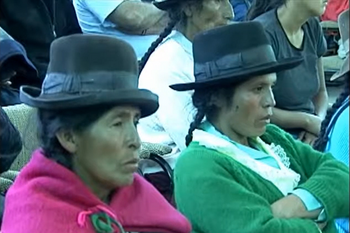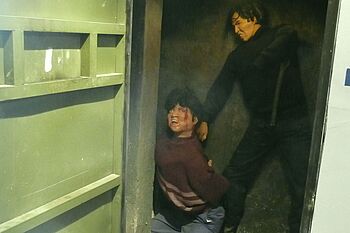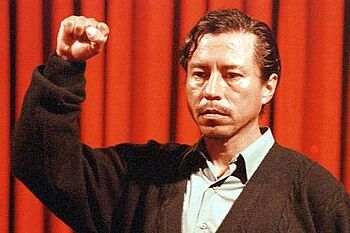The tiny photos of murdered Peruvians on display in the "Place of Memory" in Lima show only a small fragment of the suffering experienced by the population between 1990 and 2000. Early on, the Truth Commission collected thousands of statements from victims, witnesses, relatives, as well as from perpetrators. The museum's Documentation and Remembrance Centre has made many of them available online, and some can be viewed as videos.
Credit: Jon Kolbert / CC BY-SA 4.0
“They had shot them in their heads”

The Indio women listen with petrified faces as Víctor Huaraca Cule tells the Peruvian Truth Commission how he was attacked by a commando of the "Shining Path" in 1983. At the age of 23, the Ayacucha-born national police officer lost his left leg and three toes on his right foot. It was a miracle that he survived. He described his experiences to the Commission in April 2002.
"We had a bridge checkpoint. (...) Around six o'clock in the afternoon (...) we were attacked by about fifty ... sixty subversives who arrived in trucks. (...) They ordered us to surrender. Since we had a duty to the homeland and to the citizens, (...) we decided against it. We resisted the attack, and what an attack it was ... They hit us with everything, explosives, bullets, dynamite. Of the four of us, my companions began to fall one by one. (...) They ordered us to surrender and hand over our weapons. But we have a code of military justice that prevents us from handing over weapons that were given to us by the state to defend the citizens (...).
I decided to retreat (...) to a depot... where we had stored the weapons and ammunition. (...) That's when I saw an explosive device fall on my left leg, throwing me into the air (...). At the same moment (...) I lost part of my left leg and my right foot. Well, I said, (...) ... my time has come ... and if I must die, I will die with the one who arrives. (...) Wounded as I was, I decided to take cover behind a wall. That's when they blew up the whole post.
When they blew up the post, I thought, ... that may be what saves me. I thanked God for saving me. This thought enveloped me (...) They entered ... talked. (...) They took the guns (...), left me and thought: (...) he’s already finished. Because my legs lay on one side (...), they thought I was already dead. (...)
Despite my wounds, I begin to look after my companions. (...) They had shot them in the heads and cut off part of their necks. (...) Then a coca farmer came down from Huamanguilla (...). I embraced him and said, ‘If you don't take me away from here, I will die. So take me to Huanta, take me to the Huanta health post.’ When I woke up, my leg had already been amputated. It was festering. The tissue was dying. There was no reliable medical care here to take care of a wound like mine. (...)
This happened to me when I was twenty-three, at a time when I was just starting to live. I was studying. (...) I became deeply depressed afterwards. I didn't want to live any more. I didn’t think I could live such a life. But I thank God, the hospital, the police health department, the psychologists and psychiatrists who helped me overcome it."
To read Víctor Huaraca Cule’s entire testimony, click here (Spanish).
Links
Video recording of Víctor Huaraca Cule giving testimony (Spanish)
After the Dictatorship. Instruments of Transitional Justice in Former Authoritarian Systems – An International Comparison
A project at the Department of Modern History at the University of Würzburg
Twitter: @afterdictatorship
Instagram: After the dictatorship
With financial support from the German Federal Ministry for Economic Cooperation and Development
“I went to the morgue every day”

A young man is tortured in a cell. The reconstruction in the Museum of Memory in Ayacucho demonstrates how the Peruvian military tortured and often killed detainees. In 2002, the father of one of the victims, a police officer, told the Truth Commission how his son suddenly disappeared on his way home from university in Huancayo. The 20-year-old was released after being severely tortured, but he had to leave the country.
"It happened on August 25, 1992, when Miguel Ángel Cieza Galván was arrested by members of the Peruvian army after attending his classes at the National University of Central Peru in Huancayo. He was a third-year student at the Faculty of Electrical and Systems Engineering and was the spokesperson of his study group. (...)
As is well known, the National University of Central Peru went through a very difficult situation in 1991 and 1992. Political violence and systematic human rights violations occurred on a daily basis. Many may also remember that male and female students were found dead on an open field. That, gentlemen, was how people lived in the Central University at that time. (...)
I found out that two people in plain clothes had forced him into a yellow Volkswagen. We didn’t hear anything more from Miguel Ángel after that. The next day my wife went to the barracks and asked if there were any prisoners. They told her that 19 students were imprisoned. But three days later there were no students detained there. This worried us a lot and we reported the incident to the ombudsman's office. But they did not help us. They only told us, ‘Search for your children.’ And, ‘Search the morgue, too.’ Because new corpses were turning up every day in the city of Huancayo. (...)
I made inquiries at the police intelligence service, without results. So I had to focus on the ‘December 9’ barracks in Huancayo. But how? I got support from my co-workers, my bosses, my friends and relatives. So we were able to smuggle a friend into the barracks. On September 1 at 10 o'clock in the morning we got confirmation that Miguel Ángel was in the barracks. We went right to the prosecutor's office and visited the barracks. I wanted to see for myself that Miguel Ángel was physically present there. But they wouldn't let us into the barracks, not me nor the prosecutor, although I said I had seen him. (...)
I went to the National Police Command, I went to the judiciary, to the clergy... Gentlemen, I raised heaven and hell. I just wanted them to know that my son was there. And new dead kept turning up. I went to the morgue every day to look for his body. But I didn't find him and that left me with a glimmer of hope. (...)
The days passed. The political violence, gentlemen, increased more and more, until I received a phone call on September 23 telling me: ‘Your son will be dropped off in the town of La Huaycha in the Mito district.’ I took a taxi immediately and went to look for him. I was very surprised to see a large number of young people there celebrating Youth Day. But someone told me, ‘Your son is in the annex of San Luis de Yaico.’ I went there and he was actually there. But do you know what I found, gentlemen? A boy who weighed no more than 50 kg, although he used to weigh 68 kg. A boy who was torn apart, with bleeding feet, with visible traces of cruel torture. This is what I found.
I hugged my son and took him to Huancayo. But I knew they were looking for him. So I took him to a safe place where he had support. I had him now, but he was unable to eat. Every night he jerked awake, screaming, begging not to be killed. Gentlemen, that was terrible. To this day I have this painful image in my mind. It is not over! Today I am reminded again that this wound is still open. I don't know when it will heal."
To read the entire report from Oscar Cieza Pereira, click here (Spanish).
“War dehumanizes us”

With a raised fist, Óscar Ramírez Durán, the former head of the guerrilla organization "Shining Path," looks into the television cameras in 1999. A court of the Fujimori regime had just sentenced him to life imprisonment. Four years later, the staff of the Truth Commission visited him in prison and asked him to explain his view of the armed conflict. In a video, he distanced himself from the violence.
Is it alright to offer murderers a public forum? The decision of the Peruvian Truth Commission to conduct video interviews with imprisoned representatives of radical left-wing terrorist organizations and to play them at a hearing was courageous, but also controversial. The commission wanted not only to understand the motivations behind the underground struggle, but also to identify ways to achieve reconciliation. Ramírez, who was Abimael Guzmán’s successor, and who had been arrested in 1992 as "Comrade Feliciano," expressed self-criticism at the hearing in June 2003. A year later, the case against him was reopened and his sentence was reduced to 24 years. In the video, he stated, among other things:
"First of all, I would like to express my deepest condolences to all the people who have been affected by the two decades of political violence that have shaken the country. And most especially, I would like to extend my condolences to the people who have suffered the loss of loved ones.
I would also like to tell you that in the seventies, faced with the conditions of misery, backwardness, injustice and exclusion in which the great masses lived, I, like many other people, made the decision to change this state of affairs. It was about creating a new home and a better Peru. But we ended up adopting a false ideology: the shameful Gonzalo Thought (Gonzalo was the organization name of Abimael Guzmán), which led us to make many mistakes and, in the end, led us to a dead end.
There are many lessons to be learned from these two decades. One of them, in my opinion, is that war is best avoided. As one philosopher said, ‘War is a killing monster among men.’ It often turns a means into an end and although heroic deeds can sometimes be expressed in it, it also brings out the most extreme passions in people. War dehumanizes us and builds a spiral of hate and revenge, a dynamic in which hate begets more hate and revenge begets more revenge. The impulse of this spiral caused by war is difficult to break. That is why I think it is better to avoid wars.
I would also like to talk to you about democracy. After much reflection, I too have come to the conclusion that democracy, despite all its problems and limitations, is the best system of human coexistence. It is better than any totalitarianism, because totalitarianism only brings intolerance and constrains people's freedom. In the 20th century, we learned great lessons from totalitarian systems that led to negative situations for humanity. I believe that we have to draw the positive from this experience for the future, but in my opinion, democracy is certainly better than any totalitarian dictatorship.
I would like to take this opportunity to call on the state, society and all of you to show consideration and understanding for all political prisoners. A democratic society must express its political, moral and legal superiority by giving political and general prisoners the opportunity to rehabilitate and reintegrate into society. Life imprisonment or sentences of 30 to 35 years, as in our country, bury practically all political prisoners alive. This cannot be good because it perpetuates the spiral of revenge and hatred that we must banish from our society (...)."
Click here to read Óscar Ramírez Durán's full testimony.